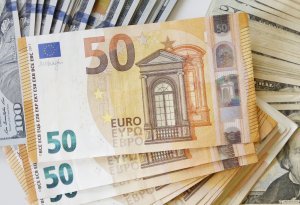Aug. 30 (UPI) — A sharp fall in energy prices in August slowed the pace at which prices are rising in the eurozone by almost half a percentage point to 2.2% on the back of an inflation spike in July after the European Central Bank cut interest rates for the first time in more than eight years.
Energy inflation went into reverse dropping from +1.2% to -3% but already elevated services price inflation ticked up by 0.2% to 4.2% while food, alcohol and tobacco slowed from 2.4% to 2.3%, according to flash estimates out Friday from the European Union’s main statistical agency.
Non-energy industrial goods fell to 0.4%, compared with 0.7% in July.
Germany, the zone’s largest economy, made the largest contribution to the slowdown in annual inflation with the consumer price index dropping to 2% with the contraction in prices dipping inflation into negative territory on a monthly basis.
Italy, Portugal, Austria, Lithuania, Finland, and Latvia all posted deflation — the latter three countries at rates of 0.4-0.5% — likely also due to the sharp reversal in the price-direction of energy.
At the other end of the spectrum, Belgium’s annual inflation rate came in at 4.5%, although that was down from the 5.4% it recorded in July. Estonia and the Netherlands had the next highest inflation levels at 3.4% and 3.3% respectively.
Together with a slight fall to 2.8% in core inflation — which strips out price-volatile items including food, alcohol and tobacco and energy — the estimates suggest the 20-country bloc that uses the euro is on track for an expected September rate cut of 25 basis points.
However, CNBC quoted economists at ING cautioning that they expected core inflation to prove difficult to get down and would likely stay above 2.5% for the rest of the year due to goods and services prices remaining “sticky.”
Analysts also sounded a warning over the widely anticipated rate cut saying the headline inflation figure glossed over the fact that precious little progress had been made in tackling the underlying causes that were fuelling prices-growth.
“The positive headline is purely down to energy price effects, and it masks the fact that little real progress in underlying pressures has been made here,” said Ballinger Group foreign exchange markets analyst Kyle Chapman.
“Now at the highest level since last October, services inflation has been glued to the 4% area for almost a year now and has headed in the wrong direction since the spring.”
ECB Executive Board Member Isabel Schnabel also appeared Friday to temper hopes for an interest rate cut from the current 4.25%.
“Policy should proceed gradually and cautiously since the current level of headline inflation understates the challenges monetary policy is still facing,” Schnabel said in a speech in Tallinn, Estonia.
“The pace of policy easing cannot be mechanical. It needs to rest on data and analysis.
“In particular, domestic inflation remains high at 4.4%, largely reflecting persistent price pressures in the services sector, where disinflation has effectively stalled since last November,” she said.

COMMENTS
Please let us know if you're having issues with commenting.